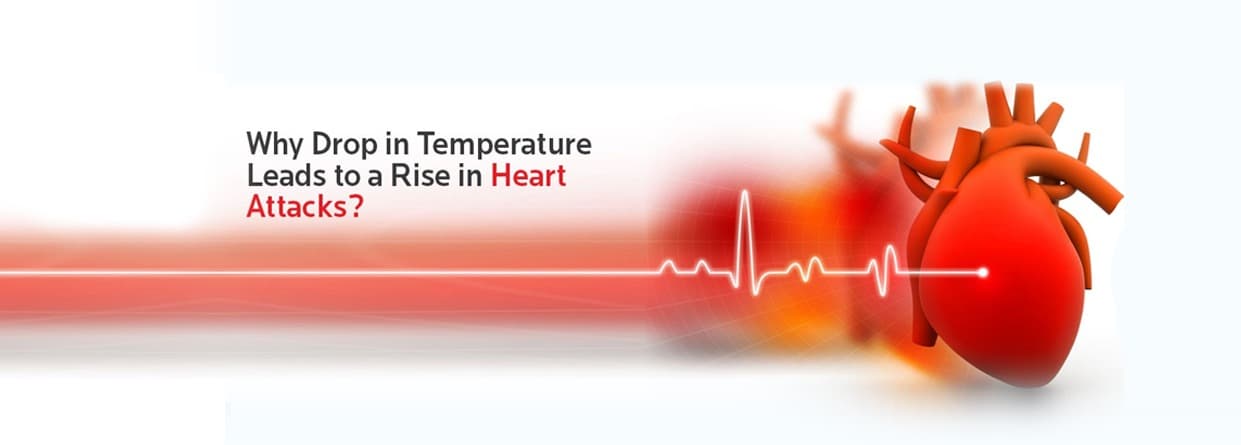
Oversized sweaters, comfy blankets, a hot mug of coffee and a warm pair of socks, all these things come into our mind when we picture ourselves in winters. While many of us eagerly await the cold season, we often tend to forget about the uninvited health issues that it brings along.
Oversized sweaters, comfy blankets, a hot mug of coffee and a warm pair of socks, all these things come into our mind when we picture ourselves in winters. While many of us eagerly await the cold season, we often tend to forget about the uninvited health issues that it brings along. No, we are not just talking about the winter blues, but rather various other serious health complications, that tend to become more common with the fall in temperature. You must have heard people complaining of their joint pain, nasal discomfort and frequent headaches, but did you know that the winter season is also linked with the increased risks of a heart attack. While some of you must be aware of this fact, it might be surprising to the rest. After all, what could possibly be the relation between the weather and your heart health? Well, experts from the best heart hospital in Kolkata suggest that cold temperature does elevate the risks of certain cardiovascular diseases, including heart attack, and if you wish to know why this happens, this blog is just for you.
Heart Attack happens to be one of the most common cardiovascular emergencies, caused by a restricted supply of blood flow to the heart. The heart carries out its function of pumping oxygenated blood to different parts of the body via a network of blood vessels, the normal functioning of which is very crucial. Sometimes, the blood vessels can become narrow, thereby slowing down the flow of blood to the heart. As a result of this, the patient starts experiencing symptoms like angina, pain that radiates towards the neck, back or arms, arrhythmia, anxiety, fatigue, and loss of consciousness.
Reports have shown that 17.9 million people died from cardiovascular diseases in 2019, and 85 percent of these were due to heart attack or stroke.
Unlike many other diseases that are more prominent in elderlies, a heart attack can affect younger people in their 20s, 30s, and 40s as well.
Experts from the best cardiac hospital in Kolkata suggest that there are multiple risk factors that can elevate the risk of heart attacks which surprisingly includes cold temperature as well.
Now you know that it is a widely acknowledged fact that the cases of heart attack hike up in winter, let's try to understand why this happens with the help of the best cardiologist in Kolkata.
Although there is no exact explanation as to why this happens, it is believed that the search in heart attack asses could be possibly due to the impact of cold temperature on the heart. Before we go any further, it's worth noting that, not only heart attack but the risks of stroke, heart failure and arrhythmia also increase during winter.
As the temperature decreases, the blood vessels start to narrow down due to an increase in sympathetic nervous system activation. This is commonly known as vasoconstriction and is marked by reduced blood flow, which is quite likely to increase your blood pressure. All this puts excessive pressure on your heart, compelling it to work harder for supplying blood to different areas of the body. During winters, the risks of vascular damage also increase, due to the increased incidence of hypothermia.
When we talk about the increased risks of a heart attack in winter, it applies to everyone, especially those who have an existing heart issue. To cope with the chilly temperature, our bodies have to work extra hard, in order to regulate enough heat to keep us warm. Otherwise This can have a dramatic impact on the, normal functioning of the heart. If you already have some condition that is interfering with the same, it can get further aggravated. Such people are highly susceptible to vasoconstriction as well.
Although the risks are high, there are many ways in which you can manage these, and safeguard your heart.
Start by going for a preventive heart check-up, which will not only assess your heart health but, will also help to detect the traces of any cardiovascular disease or ailment at the earliest. This makes it possible to treat the problem without any complications
Keep yourself warm, whether you are inside your home or going out. You can do this by covering yourself up with clothes that are best suited for the season.
Indulge in physical activities to strengthen your heart muscles and blood vessels. You can simply work out at home, or go to the gym if it's feasible.
If you have been experiencing any symptoms lately, go for a proper evaluation. Heart attacks are preventable, as well as treatable.
Written and Verified by:

Dr. Sabyasachi Pal is a Senior Consultant in Cardiology Dept. at BM Birla Heart Hospital, Kolkata, with over 11 years of experience. He specializes in coronary interventions and heart failure management.
Similar Cardiology Blogs
Book Your Appointment TODAY
© 2024 BMB Kolkata. All Rights Reserved.